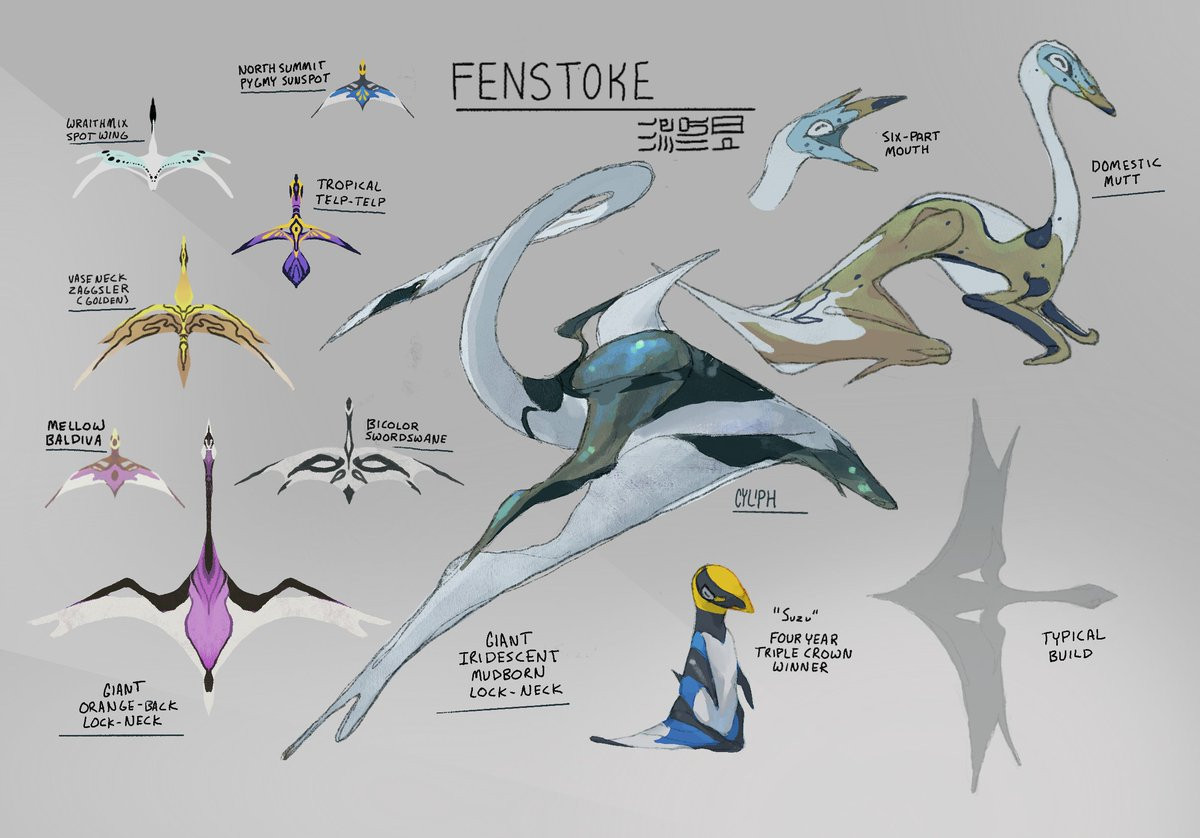HOME | DD
 Cyliph — Fenstoke Study
Cyliph — Fenstoke Study

#alien #bird #personalart #reference #scifi #conceptart #pterosaur #scififantasy #worldbuilding
Published: 2024-02-11 20:33:49 +0000 UTC; Views: 3482; Favourites: 121; Downloads: 0
Redirect to original
Description
Twitter Tumblr Toyhouse
Notes: Use as couriers and misc behavior
Personal work for a world building project
Meet the fenstokes! A domestic breed of pet popular for its coloration, disease hardiness, and friendly disposition.
Notes:
The fenstokes are a species of small domestic pet found all across civilized space. Through the centuries it has been selectively bred for its coloration with over 52 recognized distinct breeds. They are most popular as pets within former Truatari territory as a low maintenance and hardy pet for desert planets. Fenstokes also boast religious significance in many of these regions.
HISTORY: Despite its popularity much of the species history was lost following the red sun collapse. What system or ecosystem the fenstokes originally belonged to is completely unknown as related species have yet to be re-identified. What is known is that they became a popular hobby pet among spacefarers during the early stages of colonization. These pioneers selectively bred for sociability and looks among other things. Regions quickly began developing distinct fenstokes that were in high demand for a booming population. Fenstoke fanciers became increasingly common, and with them, conformation shows. Demand drove high prices for elite winners of these tournaments, that subsequently drove even more diversity within the species. This diversity pushed the species further in to the dependence of sentient races.
During its height, an estimated 119 breeds were recognized. One of the most famous fenstokes of all time is a north summit pygmy sunspot named Suzu, who survived the red sun collapse and is living out her senior years under a compassionate caretaker. Other such notable breeds include the mellow baldiva, the vaseneck zaggler, and the majestic lock-neck breeds who were said to be able to knot their own necks, twice!
However, even before the collapse the popularity of fenstokes was beginning to wane in favor of more refined pets such as the ghorlen and huji laten. Fenstokes also became less popular due to the increasing association with the estranged affluent, their inability to survive without being catered to left a bad taste in the mouths of many.
Today fenstokes are a semi-common sight in most wealthier cities and towns. They are not found on any planet in the wild with one exception; Archola. There the wealthier denizens respect the fenstokes and their spacefaring history as a symbol of Omelian religion and regularly provide food, water, and shelter to them. This in turn has become a sort of tourist attraction for wealthy pilgrims and their families.
BIOLOGY: Fenstokes are rather small, averaging just 1ft (0.3m) in length with a similar wingspan. The giant fenstokes clock much larger, at around 3ft (1m) in length from beak to tail. They have a six-part beak that is able to move food towards the gullet. They are slow movers and cannot fly, but they are decent climbers and gliders. Their movement is bat like with back wings and front arms being used to facilitate locomotion. Because of their lack of competitive traits fenstokes rely completely on others to survive. They will eat most foods as an opportunistic omnivore but have a notable preference towards salty street foods.
Reproduction is semi-slow. They give birth to live young that are mostly developed and ready to glide and eat within hours of being born. They will only raise their young for a short period of time before abandoning interest.
DOMESTICATION: The species is naturally non-aggressive and readily social towards sentient creatures. They imprint on those that provide for their needs. Being non-social with their own kind, fenstokes don’t display any aggressive or defensive behaviors towards others and are readily kept together. They can be taught simple tricks and recall.
Although not the smartest or the most graceful, they are notoriously loyal to their owners.

























